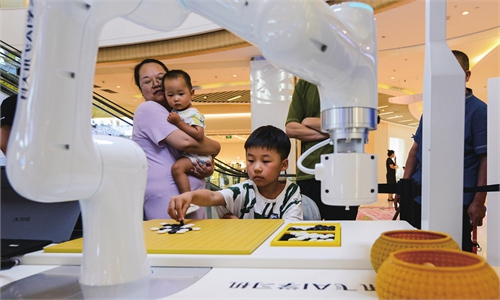
Bored businessmen and AI robot Photo: VCG
"I take pride in the fact that my course has helped a wide range of individuals transition their careers in the face of AI's growing influence," said Liang Jie (pseudonym). In 2022, Liang made a career shift from an internet operations manager to an AI trainer.
She noticed a surge in people seeking AI training courses, particularly after the popularity of ChatGPT, as they eagerly sought to capitalize on the bright opportunities offered by the booming industry and adapt to the demands of the new era.
While some people are overwhelmed with anxiety about job loss due to AI, many are actively leveraging AI to thrive in their careers. "I've seen editors, online business managers and even recent graduates seeking advice on how to train themselves to become AI trainers. They sense the potential in this field," Liang said.
Indeed, the role of an AI trainer has transformed the lives of many in Yonghe county, located in the remote mountains of North China's Shanxi Province, which was only removed from the list of poverty-stricken counties in 2020. Now, this town is closely connected to the world's most cutting-edge technology.
In Yonghe county's digital employment center, 152 AI trainers are diligently annotating vast amounts of raw data from images, texts and speeches. As they change their own destinies, the AI models they train are quietly revolutionizing various industries and job roles.
Among the 152 trainers, approximately 140 are women, with mothers accounting for 83 percent. Liu Xiuxiu, a mother of a toddler, has become a team leader after just over a year, earning a monthly income of over 8,000 yuan ($1,093).
The Yonghe base is not an isolated case; companies of a certain scale in Shanxi, Henan, Hebei, Shandong, Anhui, and other regions are also offering AI trainer positions.
The responsibilities of an AI trainer include using intelligent training software to manage databases, set algorithm parameters, design human-computer interactions and track performance tests.
"AI is like a newborn baby, completely unaware. Data annotators have to teach it to recognize and identify objects step by step, annotating raw data such as images, speeches, texts and videos into structured language that AI can comprehend," Liang told the Global Times.
In February 2020, the AI trainer profession was officially recognized as a new occupation in the national occupational classification directory. The Ministry of Human Resources and Social Security subsequently released national occupational skill standards for this profession in 2021.
A search for "AI training" yields numerous options on platforms such as Taobao, Zhihu, Xiaohongshu and Douyin. Many institutions and individuals, like Liang, offer courses to help individuals from various fields become AI trainers.
Liang joined Alibaba as an AI trainer and spent over a year honing her skills. Eventually, she developed her own AI training curriculum and started selling courses on the social media platform Xiaohongshu. Currently, Liang has a total of five trainees, charging each approximately 4,000 yuan.
Mainstream offline AI training courses currently cost from 2,000 to 5,000 yuan, typically lasting two to four days. Online AI courses are relatively cheaper, ranging from tens to hundreds of yuan. However, there are also individual courses that could go up to 6,000 yuan.
While some consider becoming an AI trainer as a new career option, many are interested in acquiring AI skills to enhance their current positions. The Global Times discovered a plethora of ChatGPT courses on social media, covering usage methods and specific applications such as office work and data analysis. There are also AI painting-related courses that teach the use of tools like Stable Diffusion and Midjourney.
Adaptability is key
Not learning artificial intelligence now is exactly the same as not learning computers back then, Gong Ke, executive director of the China New Generation Artificial Intelligence Development Strategy Academy, believes.
In the era of AI, the question arises: How can individuals handle their relationships with AI?
Propelled by the emergence of ChatGPT and the shift from analytical AI to generative AI, many are choosing to embrace AI to address their inner "sense of crisis," while others are anxious about being replaced.
In March, Goldman Sachs released a report stating that AI could replace the equivalent of 300 million full-time jobs. Last year, PwC (PricewaterhouseCoopers)'s annual global workforce survey revealed that nearly a third of respondents feared their roles would be replaced by technology within three years.
Gong said that the anxiety over AI stems more from individuals' adaptability to change rather than the fear of being rendered obsolete by AI. Gong emphasizes that individuals should focus on enhancing their ability to work alongside AI rather than worrying about machines taking over their jobs. The era of civilianization of artificial intelligence is unstoppable and it's coming.
The claim that technological progress reduces the number of human jobs lacks evidence. Concrete facts show that it replaces some of the repetitive, dirty and dangerous work of the past, including low-level mental tasks. Driven by rapid technological development, humans are compelled to become more creative and efficient in their endeavors, Gong told the Global Times.
Just as Liang's personal slogan on her profile page which encapsulates her determination to embrace AI's transformative power: "Experience the joy of AI changing the world and position yourself at the forefront."
By continuously updating her skills and staying informed about the latest AI advancements, Liang aims to remain competitive in the ever-evolving job market. "I always tell my trainees that as long as they have the desire to change, opportunities will always be within their reach."
If people just feel anxious instead of taking action to improve their skills, that anxiety will hurt them more than AI will hurt them, Liang said.
In the future, it is foreseeable that AI will create many new positions. However, an effective mechanism is urgently needed to facilitate the transition of existing job roles to adapt to these new positions, Gong noted.




